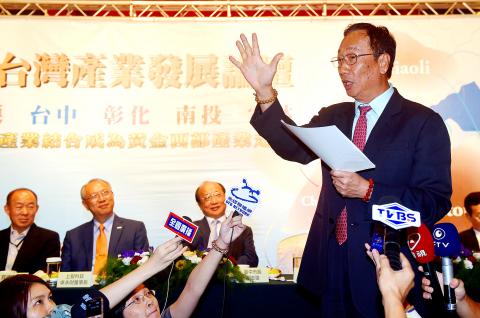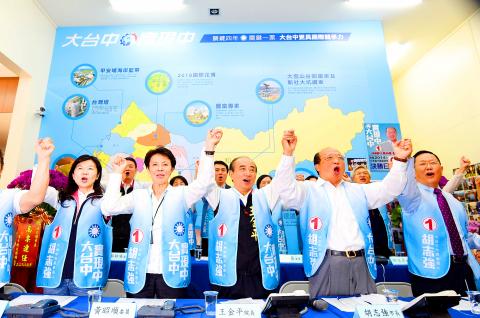Foxconn Technology Group chairman Terry Gou (郭台銘) came under fire yesterday for saying on Monday that he would “invest more” in Greater Taichung if Taichung Mayor Jason Hu (胡志強) of the Chinese Nationalist Party (KMT) is re-elected, drawing criticism from Democratic Progressive Party (DPP) Chairperson Tsai Ing-wen (蔡英文) and student activist Chen Wei-ting (陳為廷).
Tsai criticized what she called the business tycoon’s overly intimate relationship with the KMT on Facebook yesterday, saying that for Taiwan’s economy to experience vibrant and robust development, the economic environment should be distanced from political “colors,” because a political party interacting too closely with big corporations would engender a hotbed of corruption.
“Corporations getting too involved in electoral campaigns would also raise suspicion that they have engaged in quid pro quo dealings with a certain party,” she added.

Photo: Liao Chen-huei, Taipei Times
Tsai said that if an entrepreneur cares about the Taiwan’s future, “he would not pull investments from the nation simply because the ruling party changes,” adding that if this entrepreneur cares about improving people’s lives “he would start with the people in his own company by taking care of his employees, protecting the environment and helping vulnerable groups, rather than intervening in elections.”
Chen focused his criticism on the promise of a NT$200 billion (US$6.47 billion) investment Gou made while stumping for Hu in Taichung.
The student leader, who cofounded activist group Taiwan March after helping spearhead the Sunflower movement, snubbed the offer yesterday on Facebook, saying the businessman had made similar promises in previous elections that had gone unfulfilled.

Photo: Liao Yao-tung, Taipei Times
From 2002 to 2010, Gou made seven such promises during electoral campaigns that have yielded little results, Chen said, citing a chart compiled by a Chinese netizen to warn others in China against Gou’s investment plans.
“It’s such an embarrassment that a Chinese person used examples from Taiwan to caution other Chinese against Gou,” Chen wrote.
The activist said that because it only goes up to 2010, the chart probably only shows part of Gou’s unfulfilled promises, because within the past four years, the tycoon must have made more such offers.
“The most famous example of these pledges is the one he made regarding Miaoli County’s Dapu Borough (大埔). Miaoli County Commissioner Liu Cheng-hung (劉政鴻) used Gou’s plan to carry out factory expansions as an excuse to support the county government’s land expropriation. Now, with the land expropriated, rice fields destroyed and a person dead, Gou has said that no factory will be built after all,” Chen said, referring to Chang Sen-wen (張森文), who died after his home was bulldozed last year.
He added that it would not mean much if the businessman did follow through on his promises, because as “a lot of people have already pointed out when Gou threatened to leave Taiwan days ago, Gou has been enjoying subsidies and tax exemptions in Taiwan, although most of his production lines are in China. He offers less than 5,000 job opportunities in Taiwan, which is proportionally not on par with the nation’s small and medium enterprises.”
In a separate incident, DPP Taichung mayoral candidate Lin Chia-lung (林佳龍) accused Hu of siding with big business, to which the incumber yesterday replied: “The public know who is close to the corporations.”
Hu said that when Gou had asked people to not force Foxconn out of Taiwan, he had immediately thought of Taichung, stressing that politics should not hurt the economy, but the economy should not take the lead in politics either.
Additional reporting by Su Chin-feng

Chinese Nationalist Party (KMT) Chairman Eric Chu (朱立倫), spokeswoman Yang Chih-yu (楊智伃) and Legislator Hsieh Lung-chieh (謝龍介) would be summoned by police for questioning for leading an illegal assembly on Thursday evening last week, Minister of the Interior Liu Shyh-fang (劉世芳) said today. The three KMT officials led an assembly outside the Taipei City Prosecutors’ Office, a restricted area where public assembly is not allowed, protesting the questioning of several KMT staff and searches of KMT headquarters and offices in a recall petition forgery case. Chu, Yang and Hsieh are all suspected of contravening the Assembly and Parade Act (集會遊行法) by holding

PRAISE: Japanese visitor Takashi Kubota said the Taiwanese temple architecture images showcased in the AI Art Gallery were the most impressive displays he saw Taiwan does not have an official pavilion at the World Expo in Osaka, Japan, because of its diplomatic predicament, but the government-backed Tech World pavilion is drawing interest with its unique recreations of works by Taiwanese artists. The pavilion features an artificial intelligence (AI)-based art gallery showcasing works of famous Taiwanese artists from the Japanese colonial period using innovative technologies. Among its main simulated displays are Eastern gouache paintings by Chen Chin (陳進), Lin Yu-shan (林玉山) and Kuo Hsueh-hu (郭雪湖), who were the three young Taiwanese painters selected for the East Asian Painting exhibition in 1927. Gouache is a water-based

Taiwan would welcome the return of Honduras as a diplomatic ally if its next president decides to make such a move, Minister of Foreign Affairs Lin Chia-lung (林佳龍) said yesterday. “Of course, we would welcome Honduras if they want to restore diplomatic ties with Taiwan after their elections,” Lin said at a meeting of the legislature’s Foreign Affairs and National Defense Committee, when asked to comment on statements made by two of the three Honduran presidential candidates during the presidential campaign in the Central American country. Taiwan is paying close attention to the region as a whole in the wake of a

OFF-TARGET: More than 30,000 participants were expected to take part in the Games next month, but only 6,550 foreign and 19,400 Taiwanese athletes have registered Taipei city councilors yesterday blasted the organizers of next month’s World Masters Games over sudden timetable and venue changes, which they said have caused thousands of participants to back out of the international sporting event, among other organizational issues. They also cited visa delays and political interference by China as reasons many foreign athletes are requesting refunds for the event, to be held from May 17 to 30. Jointly organized by the Taipei and New Taipei City governments, the games have been rocked by numerous controversies since preparations began in 2020. Taipei City Councilor Lin Yen-feng (林延鳳) said yesterday that new measures by